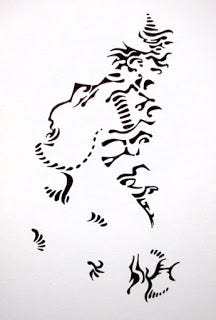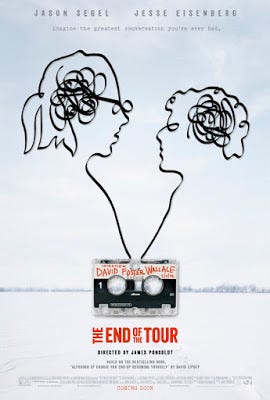The End of the Tour Revisited: A Film Based on David Lipsky’s Account of an Interview with David Foster Wallace
Writers enjoy movies about writers. You can see it in the number of blog posts here on Medium about this film alone.
 Photo by Pereanu Sebastian on Unsplash
Photo by Pereanu Sebastian on Unsplash
In one way or another films about writers usually reflect aspects of the writer’s own struggle, or shine a light on aspects of the process that we’ve all been through in our efforts to craft an article, story or more substantial work. And since all films begin as an idea that is translated into a screenplay by writers, there are quite a few movies about this dreadful profession such as Capote, Misery, The Hours, Sunset Boulevard, The Shining, Adaptation, Stranger Than Fiction and Wonder Boys.
A short list of personal favorites might include The Ghostwriter, The Diving Bell and the Butterfly and Midnight In Paris. And having just finished The End of the Tour for the second time, I may decide to place it in this latter group. It’s the story of a Rolling Stone journalist covering the last days of David Foster Wallace’s book tour promoting his opus, Infinite Jest.
It’s about a writer on assignment from Rolling Stone covering the last days of David Foster Wallace’s book tour promoting his opus, Infinite Jest.
The film was not a big box office hit. There were no special effects, no dead bodies. No chase scenes. No sex. There’s a sense in which it compares to My Dinner With Andre, which is essentially two men talking about life over dinner. In Tour, Wallace and his interrogator, I mean interviewer, exchange banter in various settings through the course of the story. Since Wallace is a fan of tennis, we could describe the action as a series of volleys, which ultimately serve to reveal both players’ characters.
* * * *
The film begins with journalist David Lipsky noticing a Newsweek review about David Foster Wallace whose 1000+ page book is getting noticed. Lipsky manages to get the assignment and flies off to spend five days with Wallace, in his home and in Minneapolis/St. Paul, the last stop on Wallace’s promotional book tour. (One scene takes place in The Hungry Mind, a book store we used to frequent when we lived in the Midway district.) In the end, these five days become the basis for Lipsky’s own book Although of Course You End Up Becoming Yourself which he produced after Wallace’s suicide in 2008.

David Ulin, in his LA Times review of the film states, “The End of the Tour is all about our relationship to image, both in the story it tells, of a writer at the very moment he became an icon, and also in the way it tells that story. The movie makes this explicit by framing its main narrative as extended flashback, a memory play provoked by Wallace’s death. It gives the action a bittersweet, nostalgic edge it did not have — could not have had — in actual life.”
Because Wallace himself was a writer who had skewered other writers, he was keenly aware of the power Lipsky was being given to shape the public’s perceptions of Wallace. How much should the object of a profile dictate the final shape of the observer’s observations?
Nat Hentoff ran in to this conflict when he wrote his first Playboy Interview of Bob Dylan in the 60’s. As part of the arrangement Dylan had the right to see the final manuscript before it went to press. Hentoff wrote years later that Dylan spent two hours making changes, re-shaping how he would come across in the final version of the piece.
Hentoff vowed to never be put in that situation again. In reality, Wallace didn’t like the role of being a specimen in Lipsky’s petri dish, especially when it appeared that Lipsky was reading things into Wallace that weren’t there.
DAVIDI’ve written enough of these “pieces” to know thatyou could present this in a hundred different ways.Ninety of which I’m really gonna come off as amonumental asshole. But it seems like your readof this is, “Huh: what an interesting persona Daveis adopting for the purposes of this interview.”
 Public domain.
Public domain.
In the LA Times story Ulin goes on to write: “And yet, that raises the question, doesn’t it, of what it means to see Wallace portrayed as a character in a film? ‘A writer who courted contradiction and paradox,’ Christian Lorentzen described him this month in New York magazine, ‘who could come on as a curmudgeon and a scold, who emerged from an avant-garde tradition and never retreated into conventional realism, he has been reduced to a wisdom-dispensing sage on the one hand and shorthand for the Writer As Tortured Soul on the other.’”
When I first saw the film, I had not yet read anything by Wallace, so I didn’t grasp many of the key elements of the story. What I did get out of the first viewing was a measure of prodding to find something he’d written. After completing a set of his essays the film took on more significance. Though it was Jesse Eisenberg (who is also a writer) as David Lipsky who I’d tuned in to see, Jason Segel stole the show with a superbly nuanced performance. Here are excerpts from three reviews on Amazon.com that I thought might help finish this portrait of the film for you.
1. Prior to seeing this film, I had limited knowledge of David Foster Wallace and his works. After seeing the film, I wanted to learn more. The End of the Tour (dir. James Ponsoldt) is a very reflective film, highlighting author Wallace on the last stretch of his book tour for his novel Infinite Jest. Our entry point into this intriguing man is David Lipsky, a Rolling Stone reporter hired to do a piece on him in the late 1990s.
2. Few times this year, or in the past few years, have I thought “Wow, this performance, or for that matter this film, is revelatory,” but I had that while watching The End of the Tour and specifically Jason Segel. What’s most impressive here is the lack of any false drama. It’s these two guys talking to each other, in the respect of a formal interview, over the course of four days, and while Eisenberg is quite good, it’s Segel who is just mind-blowingly good here. Like, this is the guy from Forgetting Sarah Marshall? And The Muppets?
He plays David Foster Wallace as disarming, shy, clever, engaging, engaged, at times appropriately miffed (or p’d off) and can also be funny and genuine and witty. These are all written in the script, but Segel makes them real, and it doesn’t feel like a put on, which would’ve been the death knell here.
3. I didn’t realize when watching the film that the dialogue is all based on, if not directly taken from, the tapes journalist (and protagonist) David Lipsky (Eisenberg) recorded of his interviewee, universally acclaimed novelist David Foster Wallace (Segel). The dialogue is rich with insight into the character’s thought processes and their observations on life (but mostly those of Wallace). I was riveted at every moment the two were talking, feeling as though being revealed before me were the truths of life.
Ah, the thrill of being a fly on the wall. And it’s not just the words containing the wisdom of the thoughtful and complicated Wallace, but the delivery via the actors and the way in which the many hours of tape are edited to allow Wallace’s ideas and observations to resonate. Even beyond Wallace’s ideas, the film cuts to the core and observes Wallace as a human being, not different for his brilliance but the same for his humanness.
This film isn’t for everyone, but I do believe there are some real takeaways for writers. Here’s the rest of that LA Times review.
Meantime, life goes on all around you. And if you’re a writer, write on.
RELATED STORY
The Magical and the Marvelous: DF Wallace’s Roger Federer Essay
Originally published at pioneerproductions.blogspot.com
 Helping each other write better. Join Us.
Helping each other write better. Join Us.
The End of the Tour Revisited: A Film Based on David Lipsky’s Account of an Interview with David… was originally published in The Writing Cooperative on Medium, where people are continuing the conversation by highlighting and responding to this story.
Read more: writingcooperative.com
